 Between now and Christmas we will be serialising Robert Cubitt's satirical version of the old Charles Dickens classic, a Christmas Carol. Christmas Eve - Some Time Ago The bell jangled to let Scratchit know that someone had entered the Counting House. He glanced over the heaped ledgers on his desk and quickly looked down again, anxious to appear busy. “Scratchit.” The new arrival shouted. “You’ve been putting more coal on this fire, haven’t you?” “Yes Mr Smooge. But it was so cold, and I only put one lump on.” “Be that as it may, I’ll be taking the cost of the coal out of your wages.” Scratchit gave a silent moan. His wages, such as they were, already amounted to so little. At this rate he would have to send Tiny Tim out to work. “Were there any callers?” Smooge called over his shoulder as he walked towards the inner office, his own private space. “None, Sir.” “Damn and blast. At this rate I’ll be down to my last million before long. There’s no profit in banking anymore, you know, Scratchit. Why, the government are even threatening to cap the interest rates on loans at a level that are affordable. What nonsense. How’s a hard working usurer supposed to make a living with that sort of attitude. If someone’s such a wastrel that they need to borrow money it should come as no surprise that they’ll pay highly for the privilege and for the risk I take in lending it to them without security.” Ending the familiar rant Smooge slammed his office door behind him, shutting out Scratchit’s reply. The younger man rose from his desk, pulling his heavy coat tighter around him, half as protection from the cold and half as a form of defence against his employer. He tapped on the door. But I’ll be docking you a day’s pay and I want you in even earlier the next day. Clear?” “Go away.” The reply came from within. Scratchit dared to tap again. There was a grinding of chair legs as Smooge stood up, followed by the thump of his boots across the bare floor. Scratchit cowered against the wrath he knew was coming. The door flew open. “I fucking said go away.” Smooge, barely taller than his employee, seemed to tower over him. “I’m sorry Mr Smooge, but I have a favour to ask.” “You can ask as much as you like but I don’t have to grant it.” “It’s just that its Christmas tomorrow.” Scratchit trembled, and not just with the cold. “I wondered if I might be granted the day off.” “What?” If Smooge had been asked to lend money at low interest rates he could not have looked more angry. “You not only take my wages but you now want to rob me of a day’s work as well.” “It is Christmas, Sir.” “It is Christmas, Sir.” Smooge whined back in imitation. “Bah humbug is what I say to Christmas. A waste of time and a waste of money. You know that if there wasn’t Christmas there would be far less poverty in the world. All that money wasted on presents that no one wants and that they need even less. Bah humbug I say.” Smooge lowered his voice a little, realising that ranting at Scratchit would only raise his own blood pressure to dangerous levels and he was damned if he was going to give himself a stroke so that Scratchit could use it as an excuse to ask for time off work to visit him in hospital. “I suppose there is some benefit. At least we’ll make a fortune out of all the loans we make in January. When I say we, I do of course mean me.” Smooge allowed himself the rarest of all treats, a short, barking laugh of satisfaction. “Yes, Sir. Thank you Sir. So was that a yes then Sir?” “Damn your eyes, Scratchit. I suppose so. But I’ll be docking you a day’s pay and I want you in even earlier the next day. Clear?” “Of course, Mr Smooge.” I have no loved ones. I have taken great care to make sure that I have no loved ones The bell jangled and Scratchit took the opportunity provided by the distraction to scurry back to his desk. “What Ho, Uncle.” The new arrival called, clearly in a good mood. “You, you damned wastrel. What do you want? You’ll get no money from me. Not while I breath.” “And nor do I wish for any, Uncle, either now or in the future. I have simply come to wish you the joy of the season and to invite you to join myself and my darling wife for the enjoyment of Christmas.” Smooge glared at the neatly dressed young man. He noted with some satisfaction that the collar and cuffs of his shirt were frayed and that he had a patch on the elbow of one sleeve of his coat. “Why is everyone so obsessed with wishing me joy and inviting me to enjoy myself? A dozen times I had it between the corner of the street and the front door. I shall spend Christmas in any fashion I wish.” “Quite right too, Uncle, but I do plead with you to consider joining myself and my family to spend it with your loved ones.” “I have no loved ones. I have taken great care to make sure that I have no loved ones. Loved ones are parasites, sucking the life and money out of a man. Now, Sir, I’ll thank you to be gone so that I may continue with something that I do enjoy; The making of money.” “As you wish, Uncle. However, the invitation remains open. If you change your mind, then you will find a welcome at our hearth.” “Stuff your welcome up your arse. Now be off with you and stop making free with the heat from my fire.” The young man shook his head in sadness at his Uncle’s bad temper and turned to leave the Counting House. As he passed Scratchit’s desk he dropped a small leather bag onto it. It jingled with the promise of coins. “A Merry Christmas to you and yours, Mr Scratchit.” The nephew offered. “A little something for your children. How many are there now?” “Just the dozen, Mr Justin Sir. Still just the dozen.” “Well done, Sir. And on the wages my Uncle pays you. It’s a marvel how you and Mrs Scratchit manage.” Scratchit was just about to tell him that they didn’t manage when the cheerful young man was gone, leaving only an icy blast of wind and a flurry of snow to mark his passage. The church clock began its chiming and Scratchit patiently counted the striking of the hours until it reached seven. At last he could go home. He closed the ledger that he had been working on and placed it in its correct position within the pile on his desk, before taking the whole heap and placing them carefully in the cupboard. He turned the key in the lock and then shuffled across to the door of Smooge’s office once again. He tapped on the door as though he was afraid of it being answered. The contrast between the ground floor and the first could not have been greater. Smooge must have heard the clock as well, because the door was flung open at once. “Where do you think you’re going.” Smooge demanded, as he always did at that time of day. “Its seven o’clock, Sir. It is the end of the day.” “Damn your eyes, are you robbing me again?” “No Sir.” He pointed a shaking finger at the clock that hung on the wall above the fireplace. Its hand confirmed the hour. Scratchit offered Smooge the key to the ledger cupboard. “Very well. If you must go home to that brood of yours. What time will Mrs Scratchit arrive?” “As soon as she has finished cooking my meal and put the children to bed, Sir. I should say about nine o’clock.” “Good. Tell her not to be late.” “I will, Sir. Can you tell me why she is visiting, Sir?” “It’s another fitting for my new curtains.” “Well, bless me. I had no idea curtains required so many fittings. This must be at least the fourth.” “Fifth actually. She must get them right. I’ll not brook any bad workmanship.” “I’ll wish you good night then, Sir, so that my wife may be here all the quicker.” As soon as Scratchit had left the building Smooge went through the evening routine of securing his premises. He triple locked the front door and threw the dead bolts at the top and bottom. Heavy bars were placed over the windows and padlocked into position. Finally he let himself through the inner door to the foot of the stairs before locking it carefully behind him. At last he was able to climb the bare wooden stairs to his private rooms. The contrast between the ground floor and the first could not have been greater. Where the downstairs was dark and dingy the upstairs glittered with gas lamps and candles. Coals burned brightly in all the hearths and cast a cheerful orange glow on the walls, which were decked in brightly coloured coverings. Rich, deep carpets covered the floors. The furniture was the most fashionable that Messrs Dee, Eff and Ess could provide. Smooge’s housekeeper had left food warming in the oven of the most modern kitchen that Smooge had been able to purchase. The aroma of meat and gravy caused Smooge to salivate as soon as he walked into the room. First things first, however. Smooge went into the bathroom to run himself a nice hot bath. The bathroom was his pride and joy. The walls were tiled from floor to ceiling in marble. Mirrors sparkled, reflecting the light from the gas flamed chandelier. Gold taps and fittings adorned the bath, the sink and the toilet. He allowed himself a small sigh of appreciation as he put the plug into the bath and let the steaming water run into it. He splashed a scented liquid into the jet of water and suds began to form, filling the steam with the rich aroma of exotic plants and spices. “Because you’re worth it.” Smooge muttered to himself. Later he dressed himself carefully in a velvet smoking jacket over rich, red pyjamas. A knock came at the side door to the apartment. He had timed it perfectly. Peering through the spy hole, Smooge smiled as he saw the rosy round face of Elisa Scratchit silhouetted against the night, shivering at the top of the iron staircase that led to the door. He turned the key and let the wife of his clerk into the apartment. Episode 2 of this story will be posted in next week’s blog, but if you don’t want to wait until then to read it, you can purchase the book right now by clicking on the button below. And if you don't want to miss an episode, be sure to sign up for our newsletter. Just click on the button below.
0 Comments
 We started a free book giveaway yesterday, which prompted one of our team on the Zoom call (we don’t have an office – it helps keep costs down) to ask if free giveaways actually work. Which is a very good question. By the way, if you didn’t know about the free book, it just shows the value of signing up for our newsletter – but that’s another issue. We know that people like to get something for nothing, but that isn’t why we give away free books. No, we give books away in the hope that the enjoyment the readers get from it will encourage them to buy more books by the same author. But you knew that already. What you really want to know is if it works or not. Which is a very … sorry, we’ve said that once.  One of our authors One of our authors The answer is that there is no short answer. We can’t point our finger at the work of one of our authors and say “Because we gave away one of his books for free, we then sold more by him” (or her as the case may be). There are some people who do free book giveaways in order to generate lists of email addresses they can use for marketing - you have to email a certain address to get your free copy. We don't do that. We think it's a little bit underhand. When we do a free book giveaway it is always done through one of the etailing sites so that we don't know the email address of the beneficiary. Or we allow a direct download from this website, for which you don't have to provide an email address. (see our "Freestuff" tab to find out what's on offer) But to get back to the point, let’s take this from first principles. If you are trying to get people to buy more books by the same author, then it follows that they must have more than one book available. So, for first time authors, this isn’t going to do them much good. You may think that is stating the obvious, but it is amazing how many first-time authors do free giveaways in the hope of stimulating sales. Just goes to show how hope can delude people sometimes.  “But it will get my name noticed.” Some authors will reply. No, it won’t. Your name will only be noticed by people who take a free copy of your book. OK, they may come back for your next book, but you haven’t even published that yet, so by the time you do, your name will probably have been forgotten again. For authors who have multiple, but disparate, titles it is hard to see a connection between the sales of titles that have no connection to the one given away for free, ie books that are about different groups of characters, even if they are in the same genre. If you track your sales and there is a sudden surge of interest in some titles, then it does suggest that the free giveaway had some influence. But if the change in sales is less dramatic it could just mean that some new readers have discovered your books and it has nothing to do with the free giveaway. Indeed, the new readers may not even have read the free book and might buy it later if they like the ones they have bought.  It is in sales of books that are written as a series that we see the greatest effect of free giveaways. If it is Book 1 of the series that is given away (which is the sensible way of doing things) then we know that Books 2, 3 etc are probably going to increase their sales if the readers of Book 1 enjoyed it. So, if you are an author that writes a series, then this is something worthy of your consideration. What about books written as ‘tasters’ – stories that are less than full length books which are given away as an introduction to the series. These are usually a prequel, but they don’t have to be.  I have to say we have seen very little evidence that those justify the amount of work that is invested in them. If you know differently, then do get in touch and tell us. There are a couple of issues with tasters. The first is the amount of time they take to write. Every author has some idea of how long it takes them to write a full-length novel, but does writing a half-length ‘taster’ story take half the time? Does it take less, or does it take more? And we all know that Benjamin Franklyn said that “Time is money.” Are you going to generate enough sales of your taster to make it worth the investment of time that you have made in the writing of it? You hope you will, of course, but I’ve already mentioned how hope can delude us. 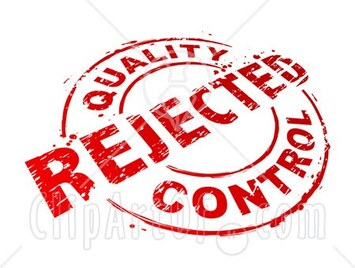 The other issue is quality. I have read some taster novels which are nowhere near as good as the books they seek to promote. Perhaps it’s a psychological thing and the author subconsciously doesn’t try so hard to write a good story for a work they know is going to be given away for free. And if the taster isn’t good enough, it isn’t going to encourage sales of the full price book. That doesn’t apply to all tasters, of course. I have also read some that are brilliant and a good advertisement for their product. It just isn’t a universal truth. But is it enough just to give the book away for free? Should you do more? Yes, you should. 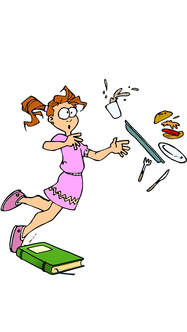 As with all books, readers aren’t going to stumble across your free book by accident. OK, most book etailing sites maintain lists of their free books, so your offering will appear there. But it isn’t the marketing channel you need to appear in. The sorts of readers who haunt the listings of free books are the sort who want to read, but don’t want to buy books. Yes, they’ll download your book because it is free, but there is a good chance they won’t come back and buy the ones they would have to pay for. They’ll be back browsing the lists of free books, looking for their next read No, you need to entice the book buying public, not the freebie lovers. And that means promoting the fact that you have a freebie on offer which they might consider looking at. Those are the readers who will buy Book2, 3 etc of the series. You may also get some reviews, which always help sales. So wherever and however you promote your books, that is where you also have to promote your free offer. You may even have to invest in advertising.  I know it sounds insane to spend money in order to give something away for free, but it does work. Thousands of businesses pay to advertise free and ‘buy-one-get-one-free’ offers and they wouldn’t spend the money if it didn’t work. You need to think of this as a long-term strategy. Yes, it may cost you £50 to run a Facebook advert for your free book, but if you get enough sales of the rest of the books in the series, the cost of that advert could be repaid many times over. So, for those of you who are considering doing a free giveaway, the key points to take away from this blog:
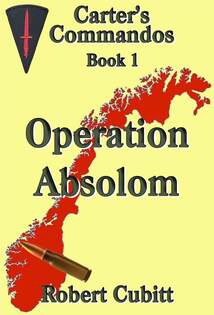 And if you are reading this before midnight on 31st October, you can still get “Operation Absolom” by Robert Cubitt for free. Just click the cover image to find out more. If you have enjoyed this blog or found it informative, why not sign up for our newsletter. At least, that way, you won't miss out on our next free offer. Just click on the button below.  Many an “Indie” author will tell you that the hard part of being an author isn’t the writing of the book, no matter how hard that seemed at the time. No, the hard part is actually selling the book to readers. Let’s face it, it doesn’t matter how good the book is, if no one knows it exists then they can’t buy it. Readers rarely, if ever, just stumble across a new author’s work. It may occasionally appear on Amazon under the heading of ‘People who bought …. Also bought …..” but that is the equivalent of hoping to hit a fish by throwing a stone into the sea. OK, theoretically you could, but it’s unlikely you will.  Do not confuse marketing with advertising, because advertising is just a small part of the marketing mix which we will discuss later in this blog. It is covered under the P for promotion part of the mix, but even then it is quite a minor part. Back at the beginning of this year we published a series of blogs that discussed marketing in depth. If you want to read the whole series then look under February in the archive and scroll down to the bottom of the page to start at the beginning. Don’t be confused by the fact that the first blog is Week 5 – the first 4 weeks were looking at the dark arts of publishing. The series continues into March and April But before you go and look at the archive, we’re going to reprise some of the highlights of those blogs to give you a few things to think about. Call them the ‘key messages’.  We’ll start with the marketing mix – the 6 Ps. Some marketing blogs talk about the 4Ps, but we’re a bit like Spinal Tap, our Ps go all the way up to 6 (Younger readers may not get that reference). These are:
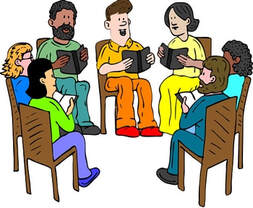 The most important P is people The most important P is people You might think that ’promotion’ is the most important part of the marketing mix, but it isn’t. It’s people. You can 'promote' your ‘product’ as much as you like, but if you aren’t reaching the right people, then you are wasting your time and, probably, your money. Your ‘people’ are the people who read books similar to the ones you write. They are the ones you need to identify and engage with on social media. I say ‘engage’, because if you just ‘promote’ you will lose their interest very quickly. Yes, you can promote, but only as a small part of engagement. You need people to want to follow you, which means having something interesting to say. And if you doubt that, consider this – you’re reading this blog, aren’t you? That is part of our ‘engagement’ with you. Maybe, as a consequence of our engagement, you might take a look at the ‘Books’ page of our website to see what we have to offer – or maybe you won’t. The choice is yours, but the important thing is that you are here, which makes the choice easier.  Paying companies to blast out Tweets about your book won’t get you sales -despite their promises of having a gazillion followers. Because only the Tweets (or other social media posts) that reach the sort of people that read your sort of books are of any use and only you can identify and engage with those people. Just as an aside – doing a #writerslift on Twitter isn’t engagement, it is just becoming increasingly annoying because so many people are doing those. And everyone in the list replying to it and filling up notification boxes is even more annoying. We’ve started blocking all the people who do it. We’ll assume from the start that your book is well written, has a good plot, interesting characters, has been properly edited, proofread and corrected. It is therefore fit for purpose. Only you and your Beta Readers can judge that. So that part of the next P, ‘product’, is OK. 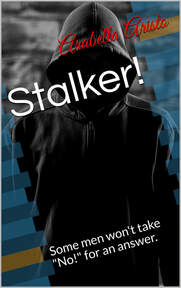 After that the most important part of the product is the cover. Despite the warning in the old proverb, people do judge books by their covers. So, yours must be right for your genre. The cover image is what is going to attract people’s attention, so it has to be eye catching and genre appropriate. A picture of a woman in a big bonnet walking through a field of daisies isn’t going to sell many sci-fi books. The second thing about the cover is that it should tell the reader a little bit about what is happening in between the covers. Call it a visual representation of the plot. A picture is worth a thousand words, or so they say, so make sure that the picture on your cover is using those thousand words to best effect. Here’s one of ours which, we think, tells you a lot about the plot.  What about price? How much should you charge for your book? If you are a big-name author, you (or, more likely, your publisher) can get away with charging £12.99 ($14.99) for your book. If you are an unknown or Indie author, don’t even think about it. There is some interesting psychology related to pricing. On the one hand, people expect to pay more for a quality product. On the other hand, everyone loves a bargain, even readers. Where you pitch the price of your book is therefore important. Price it an 99p (99c) and readers may think ‘It can’t be very good if they’re practically giving it away’. On the other hand, price it at £12.99 and readers may say ‘I’m not going to pay that much to read a book by an author I’ve never heard of’. We price our ebooks at £4.99 ($5.99) and that seems to be about right for us. But the key messages are (a) don’t undersell yourself and (b) don’t price yourself out of the market.  When we talk about ‘place’ we mean the places where you promote your books rather than the places you sell them. We’re going to assume that your book is listed on all the relevant ebook etailing sites and, for those of you that don’t want to give money to Geoff Bezos, all we can say is that if you aren’t on Amazon, you aren’t anywhere. Internet searches always place Amazon at the top of the results, so if someone is actually trying to find your book, that is where it will appear first – and perhaps the only place on the first page of results. Amazon's Kindle Direct Publishing offshoot also allows you to publish in paperback without paying expensive set-up charges or buying a minimum number of copies. But in our terms, place means your choice of social media site(s) on which to engage with readers and promote your work and your choice is important.  If you want to reach young people, then Facebook isn’t the place and Twitter is iffy at best, because young people are always on the newest, trendiest platforms. Only 51% of social media users between ages 12 and 18 use Facebook – the second smallest group. So you need to do some basic research to make sure the platform(s) you are using are the right ones to reach your target audience. But don’t rely on social media alone. Local newspapers and radio stations are always looking for content, so a short item (written by you) will fill some column inches for them or an interview will fill five minutes of radio time. But, again, don’t expect them to find you. You have to reach out to them. Also, check your local community resources (libraries, schools, colleges churches, clubs, societies, etc) for events where you can go along and talk about your work (and maybe sell a few copies).  Promotion can be anything from a Tweet or Facebook post to a video, podcast, a free extract or paid for advertising. I don’t aim to cover all of those. Instead I’ll focus on the one that you have to pay for – advertising. Social media has given us all the ability to run relatively cheap advertising campaigns – but which ones work and which don’t? Ask us a question that we can answer. Because, again, it depends on the advertising channel you use. There is no point in paying for and advert on Facebook if hardly any of your target audience ever uses Facebook. We can tell you where we get the best return on our advertising budget – but that would be more confusing because we use different platforms for different books, because different audiences use different social media platforms. What we can tell you is that spending money on Amazon doesn’t seem to work for us. We don’t know why that is, but we have had very little success there. Other publishers and authors tell us that they have had significant success using Amazon, so we can’t explain it. But one important detail about advertising. Makes sure your advert includes the following:
 You’re now wondering what I’m going to say about ‘process’. Actually, not a lot. I’ve tried to get the messages in this blog in the order you need to address them. That’s about all the ‘process’ you need to worry about. But if you want to be successful your ‘process’ must also include research:
 Without that research, you may as well be standing on a street corner shouting ‘buy my book’. And you will be no more successful. And, if doing research sounds like too much hassle, then good luck getting people to stumble across your book by chance. If you have found this blog informative or entertaining (or both) then make sure not to miss future editions by signing up for our newsletter. Just click on the button below. 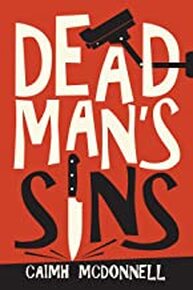 It is fair to say that I am a fan of the work of Caimh (pronounced Keeve) McDonnell. I have never made a secret of it. I won’t rest easy until his books are being read by the whole of the British and Irish reading public and a fair few other nationalities in the English speaking world (apologies to the Irish who speak Gaelic as their first language). It therefore gives me great pleasure to review “Dead Man’s Sins” and award it five stars. It isn’t the plot that makes this book so enjoyable. It is OK, it gets the job done and all that. No, it’s the dialogue.  In places the dialogue is so authentic and humorous that you feel you are listening into a conversation in a Dublin pub. It is the personification of “the craic” and you can almost smell the Guinness fumes rolling off the page (or through the screen of your e-reader). I would give you a few extracts to demonstrate what I mean but, taken out of context, they would be meaningless. Believe me, I tried, but I had to delete them because they didn’t give me the delight they did when they were part of the book. So I guess you’ll just have to trust me. 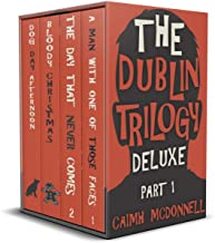 Caimh McDonnell started off writing “The Dublin Trilogy” a few years ago and the series now contains so many books that the word “trilogy” has been rather bent out of shape. There is also a spin off series set in New York, but I won’t go into that here, even though it does feature the main character from this book, which is set before he departs for the Big Apple. “Dead Man’s Sins” is book 5 of The Dublin Trilogy and is also a sequel to “Angels in the Moonlight”, which is book 3, but is set several years before books 1 and 2. And “Dead Man’s Sins” came out after Book 4, which is set after Book 2. Look, if you managed to deal with Star Wars episodes 1 to 3 being screened after episodes 4 to 6 but before episodes 7 to 9, you’ll get past this, OK!  The author - Caimh McDonnell The author - Caimh McDonnell Don’t worry if you haven’t read the earlier books. The plot of this one stands up well enough on its own and you’ll get the essence of the main character quite quickly. Which brings me to the protagonist for the book, Detective Bernard ‘Bunny’ McGarry, pride of the Garda Siochana. That’s the police, fuzz or cops to anyone born outside of Ireland. Bunny’s policing style is unconventional, to say the least but he gets results and that’s what counts. The story opens with Bunny unwillingly taking a sabbatical from the police. He receives what amounts to a distress call from the elderly mother of his dead partner (in the “colleague” sense of that word) ‘Gringo’ Spain. The elderly Mrs Spain is about to be evicted from her home by a rather nasty Dublin loan shark and, out of a sense of duty towards his dead partner, Bunny feels obliged to intervene. Bunny goes to see the loan shark, Coop Hannity, argues with him, threatens him, steals a garden gnome and departs. Unfortunately, the whole incident is captured on Hannity’s CCTV security system, the quality of which would make MI5 jealous. Why unfortunately? Because the next night Hannity gets stabbed to death. But it is the dialogue that made this book for me. So now Bunny must find out who killed Hannity or risk becoming ‘prime suspect’ himself. To help matters along, the detective assigned to lead the murder hunt is an old adversary of Bunny’s, who would love nothing more than to bang his old enemy up for the crime. From there the plot ticks along nicely, with enough incident to keep the pages turning. It is fair to say that this book is on the lighter end of the crime novel spectrum, as are all the Dublin Trilogy books, so if you want something heavier, stick with Ruth Rendell and Ian Rankin. But it is the dialogue that made this book for me. In parts it is so sublime it is a thing of beauty in itself. It provides most of the humour and all of the charm. I have been saying for years that these books would make a great TV series and it is dialogue like that which would come across so well on screen. I highly recommend “Dead Man’s Sins” I have only one flaw to comment on. The author leaves a loose end unresolved, which was a bit frustrating. It isn’t related to the central plot, but it left me asking “why didn’t he tell us who did…well whatever it was that they did ... and why?” There was a particular point made during the incident which suggested deeper skulduggery but was left unexplained. However, it wasn’t a big enough deal for me to downgrade my 5 star rating for this book. For fans of Irish humour, Irish crime drama or for readers who want to try something new and very entertaining, I highly recommend “Dead Man’s Sins” by Caimh McDonnell. To find out more about the book, just click on the cover image at the top of this blog. And if you would like to become a guest reviewer for the Selfishgenie blog, just go to the contacts page to communicate with us. There are just three rules:
If you have enjoyed this blog, found it entertaining or informative (or all three) then be sure not to miss future editions by signing up for our newsletter. Just click the button below.  Authors have a bit of a love-hate relationship with reviews. We all want them, because we know that reviews help to sell our books. But we don’t want the bad reviews, because they have the opposite effect, or so we believe. But the one thing an author can’t predict, is how any reader will view their work. No matter how good your book is, there is almost certainly going to be someone who doesn’t like it. Regular readers of this blog will recall the one where we noted Oscar Wilde’s less-than-charitable views on Dickens’ book “The Old Curiosity Shop” and Dickens was considered to be a giant of the Victorian literary world. 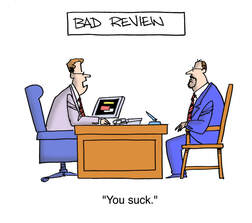 That’s the problem with reviews, we have no control over them. But a bad review can serve a purpose for an author. If we can identify what the reader didn’t like about our book, we can make sure we don’t do the same thing next time. After all, the definition of insanity is doing the same thing over and over and expecting a different result, so bad reviews provide learning opportunities. And if you are the sort of author that thinks they have nothing to learn from readers, you are probably doomed to get bad reviews forever. As a reader I do take a look at reviews, but I don’t actually read that many of them. You may think that is a bit odd, to look at them but not read them, but there is method in my madness. I mainly look at the split between the good reviews and the bad ones. If there are more good reviews than bad, then I’ll probably give the book a chance.  I do sometimes look at the bad reviews, to find out why the readers didn’t like the book. But I am very selective about the ones to which I pay attention. If a bad review is well written, in good English and provides valid reasons for why the reader didn’t like the book, then I’ll take it seriously. But if the bad review is just a short sentence which is mainly abuse, or if it’s written in a style that's the internet equivalent of a blunt crayon, then I don't take it seriously. I started using this method a few years ago, after reading hotel reviews on TripAdvisor. If someone has given a hotel a bad review, when everyone else seemed to be fine with it, then there has to be a valid reason (or so I thought). 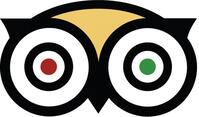 I’ll give you an example. We were going to visit Crete and wanted a nice hotel, but at a budget price. I found one that seemed to fit the bill and started reading the reviews. Most people were very positive about the hotel, but there were a few one-star reviews, which worried me a little. So I looked at one of them. The author of the review complained bitterly about a road running between the hotel and the beach. Apparently, the hotel’s website hadn’t mentioned it and he thought that he should have been told about it, as the hotel was listed as “beachfront”.  Well, we booked that hotel anyway, because both the location and price were right. And the road? Well, we expected to find a six-lane superhighway with cars whizzing up and down all day and all night at 100 mph. What we found was a very narrow road used to service the beachfront hotels and the number of vehicles using it each hour could probably be counted using the fingers of one hand. And they were being driven with caution. It took three paces to cross it (I counted them) and there we were, on the beach. So how was the hotel otherwise? It was OK. Actually, it was more than OK. We had a very nice week, ate some good food (OK, it wasn’t Michelin star standard, but it was tasty and plentiful) and drank some nice wine and all within our budget. We were happy to post a 4-star review after we got home. And that’s why reviews have to be treated with caution, especially the bad ones. People get upset about the strangest things and they take it out on whoever is handy. In the case of TripAdvisor, it’s the poor hotel owners who bear the brunt and in the case of books it’s the author of the book they just read. 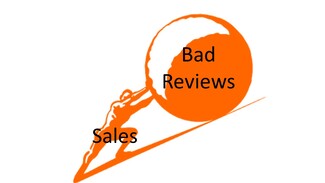 So, if you are an author and you get the odd bad review, please remember that you can’t please everyone. And if you are a reader, please remember that if the majority of other readers thought a book was worth four or five stars, then it is probably worth giving it a go. And if you are a reader who is going to post a bad review, please make sure that the standard of English you use is at least as good as that of the author you are about to criticise. It also helps considerably to say why you didn’t like the book. You will have your reasons, and the whole purpose of the review system is to share those reasons with others. Is there a “good way” of writing a book review? Author Luisa Plaja offers this advice.  Write a couple of sentences telling the reader what the book is about. Keep it short and simple; this shouldn’t become a synopsis of the book. For those readers familiar with the term “elevator pitch”, think about it like that. Tell the readers what you liked about the book. Even the worst books have some redeeming features, so make sure you write about those. After all, the author deserves praise for giving you the things you enjoy.  Tell the readers what you didn’t like about the book. This is the justification for awarding anything below 5 stars for the review. Even if you still award 5 stars, there may be something that you didn’t like, even if it was only a minor flaw. Be quite specific about what you did and didn’t like. Was it a character? Was it something in the plot? Was it the author’s use of language? Focus on why you didn’t like whatever it was, because that is what people always want to know. Whatever it was, the author may benefit from your insights and they can then correct the issue in their next book – which means you get to read better books. Obviously, the balance between the lengths of the paragraphs describing what you liked and what you didn’t like should reflect how you felt about the book as a whole. If you liked the book, then the “good” paragraph will be far longer than the “bad” paragraph.  Summarise your review with your overall impressions. If you are mainly positive, then your summary should also be positive and vice versa. But don’t just repeat the previous paragraphs. Although Luisa Pelja doesn’t mention it, we think it is helpful to mention the genre of the book up front. After all, readers don’t want to waste their time reading a review of a book they are unlikely to buy because it isn’t in their preferred genre. Here at Selfishgenie, we also make our recommendations clear: yes, definitely read this book if you like this sort of thing, or no, steer well clear. Is there anything a reader shouldn’t put in a review. Luisa Pelja doesn’t offer any advice on that, so we will.  Don’t be abusive. First of all, the author didn’t set out to write a bad book so they shouldn’t be abused for trying their best. Secondly, your opinion of the book is just that: an opinion. It isn’t a fact. Abuse isn’t constructive – it’s destructive. There is no beauty in destruction. Finally, abuse tells the world more about the abuser than the abused. The book reviews we publish on our website mainly conform to the format described by Luisa Peljac, but we do go further. That is because our reviews are also blogs. They are intended to go further than just looking at the book; they also provide information about the author, what sort of people may enjoy the book and maybe a few homespun stories about how the reviewer stumbled across the book in the first place. But for reviews that are posted on Amazon, Goodreads etc we stick to the basic format described above. And finally, if you have enjoyed this blog, found it entertaining or informative (or maybe all of those), be sure not to miss the next edition by signing up for our newsletter. We promise not to spam you. Just click the button.  If you are with someone who gets bitten by a snake, what do you do to help them? If you are thinking “I cut the wound and suck out the poison” then you are wrong and the person who was bitten will probably die. Such is the power of Hollywood movies that millions of movie goers have grown up thinking that, in an emergency, that’s the way you treat a snake bite. In a similar vein (pun intended), you may think that the way to get rid of leeches is to burn them off with a cigarette end. I’ll give the correct methods for dealing with both those things at the end of the blog if you want to stick around, but the point I’m making is about research and why it is so important for authors to do it properly, rather than relying on what they think they know – because they may be wrong.  Many readers follow a particular genre of books because they have an interest in the subject the author is writing about. People interested in the “Old West” will read westerns, people who are interested in history will read historical fiction, usually focusing on a particular period. And, let’s face it, with so much crime drama on TV, everyone thinks they know about the law these days. But because those readers have an interest in those things, they tend to be quite knowledgeable - which makes life difficult for the author. If your reader knows as much, or more, about the subject than the author knows, then the author quickly loses credibility if they get stuff wrong. And if the author loses credibility, they lose the reader. They may also get an adverse review for their book, which will affect future sales. Which is why research is so important.  We have received submissions from authors where the research has been poor or non-existent and when we have provided feedback on that, they have responded by pretty much saying “research is for losers”. OK, they may not have used those precise words, but that was the tone of the message. Or they have pointed us in the direction of the TV show or movie from which they got their information. Which brings us back to snake bites and leaches. TV shows and movies are produced for the purposes of entertainment. Some have high production values and take care to get their facts right. Some just want to get a story onto the screen and aren’t bothered about the facts. Sadly, it’s the latter that seem to work their way into the brain. 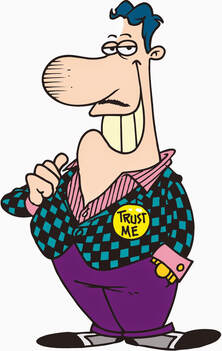 If you are an author that wants to be regarded as credible, then taking care about facts is important. You are taking the reader on a journey in which you will make your characters do some incredible things. Some of those things may not be possible in real terms, but you want you readers to believe they are. Which means that they should trust you and the way you get them to trust you is by getting the real stuff right; the stuff the readers know about already. And if you have to stretch the truth in order to make a story work then it is good manners, at least, to tell the reader that you have stretched the truth and in what ways you did it. For example, if you have mentioned an historical battle and placed it in the same year as you have set your story, when in fact it was a year or two earlier or later, then tell your readers that and tell them why you did it. They will respect you for your honesty and, more importantly, they won’t embarrass themselves in the pub when they argue about it with their pals.  So, what is research? One dictionary gives the definition as “the systematic investigation into and study of materials and sources in order to establish facts and reach new conclusions.” Note the use of the word “systematic” in the definition. You have to know what you are looking for and that directs you to the places where you will find it. Asking the right questions is always a good start. 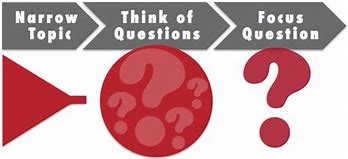 Research methodology Research methodology For authors this means asking questions about the people, places, events, dates, times, artefacts, fashions, technology, science, theories, outcomes and a whole lot more, depending on the genre in which the author writes. What isn’t research? We’ve already mentioned TV and movies (though factual programmes can be helpful) but it also isn’t using the internet. That is a useful tool, but it is littered with inaccuracies and if you aren’t an expert yourself, you may end up repeating someone else’s errors.  Comedian Dave Gorman Comedian Dave Gorman I’ll give you an example. The Wikipedia page for British comedian Dave Gorman stated that he had achieved a certain feat on a bicycle (he is a keen cyclist). It even showed an image of him in full lycra (spandex for our American readers), standing next to his bike. He hadn’t achieved that feat, something to which he freely admitted. The citation that backed up the statement was for a small circulation local newspaper that had got its facts wrong. Gorman told Wikipedia that and they removed the offending reference. A week later it was back in again, with the same citation, because the person who had edited the article claimed that the newspaper article was correct and Gorman was wrong. Yes, the person who knew what he had and hadn’t done was deemed to be the one in error. And that’s the internet for you.  So, what research do you do? No matter what the subject, someone will have written a book about it. In all probability there will be more than one book. So that’s where you start. Reading more than one book on a subject gives the author several things:
Yes, reading books is time consuming. But better to take a bit of time and get a better book, than take short cuts then get bad reviews because you’ve got your facts wrong.  Interview witnesses Interview witnesses If events are more recent and there are living witnesses, then research is interviewing them. Witnesses add real texture to a story and turn dusty old facts into reality. Even better, they can add an emotional depth to events. This approach also works with getting information from experts. Talk to doctors, police officers, lawyers, scientists, soldiers etc to find out what really happens behind the scenes. This is especially important when it comes to procedural issues. These experts can also explain things in simpler terms than some of the books on the subject. All those people can also tell stories of their own experiences, which can be woven into the author’s plot. Of course, interviewing people takes time, but with modern technology it can often be done without leaving the house. At least make the effort.  Visit locations Visit locations Finally, visit the real locations and study the places where events happened, or where you want them to happen in your plot. It is quite clear that Dan Brown had never actually visited Rome before he wrote “Angels and Demons” and that is very apparent to people like me who have been there and then threw the book across the room in disgust at him getting so much wrong. Yes, location visits are expensive, but they are also tax deductible. *  The last resort The last resort Only if you are completely unable to do any of the above should you rely on the internet and even then you should read as many sources as possible to make sure that you aren’t being misled. There are many websites that actually hold first-hand accounts of events and extracts from other reliable sources. Wikipedia may be good for a quick overview of a subject, but don’t rely on it for some of the detail (see above re Dave Gorman). And never rely on TV shows or movies. So, now that I’ve exhausted the subject of research, how do you deal with snake bites and leaches? Snake bite. Remove jewellery or watches from the affected limb, in case the injured area swells up and cuts off the blood supply. Keep the wound below the heart to slow the circulation. Seek medical help immediately. It helps to be able to identify the type of snake, but don’t take any further risks in doing so. By the way, the reason cutting the wound and sucking doesn't work is (a) because the poison spreads too quickly and (b) any poison that is sucked out will only be a fraction of what was injected. Removing leaches. The best thing to do is to let them drink their fill. Once they finish feeding, they will just drop off (it takes about half an hour). If you don’t want to wait, then identify the head and apply pressure on either side by sliding the thumbs gently towards the head. The head should pop out and the leach can be lifted off. Burning the leach with a cigarette will work, but it runs the risk of burning the skin, which can then become infected, which will cause way more harm than the leach. Yes, we did research those answers before posting them. * This doesn’t mean that authors can take a holiday and then deduct it for tax purposes. There must (a) be a published book resulting from the trip and (b) only the proportion of the trip that was actually spent doing research can be deducted, not the time spent lying on a sun bed. Incidentally, the cost of books and travel to undertake interviews is also tax deductible. If you have enjoyed this blog or found it information, and want to make sure you don't miss future editions, why not sign up for our newsletter? Just click the button. Readers are reminded that all book reviews are the opinion of our guest reviewers and not necessarily those of Selfishgenie Publishing. 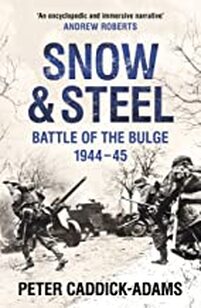 Like many of my generation, I learned a lot of my World War II history not in the classroom or from non-fiction books, but in the cinema. I now realise that was a great mistake, because those films were made for entertainment and are therefore over-simplified. They are also often embellished, which is worse because the true stories are usually dramatic enough not to require embellishment. Take “The Battle Of The Bulge” for example. While the film is based around factual events and does feature some of them in its plot, such as Nazis dressing in US Army uniforms as a deception, it then descends into an over-simplified race to gain access to Allied fuel stocks to keep the German tanks on the road. Even the scenery isn’t authentic as the tank battles are filmed on flat ground in a less than chilly Spain, so the snow that is present in the early part of the film is missing in many later scenes (something I didn’t pick up on in my youth). While that is one feature of the battle – the Germans were very short of fuel – it isn’t the main reason why the battle was lost. And it certainly wasn’t the reason the battle was fought in the first place. 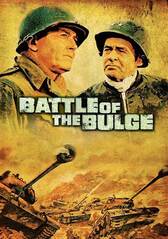 The film's poster, featuring Robert Ryan (right) as Lt Gen Grey and Henry Fonda as Lt Col Dan Kiley. The film's poster, featuring Robert Ryan (right) as Lt Gen Grey and Henry Fonda as Lt Col Dan Kiley. The film also forgets some of the main features of the battle, which were the intense cold, the appalling condition of the roads and the incredibly challenging terrain over which the battle was fought: thick pine forest, steep hills and criss-crossed by rivers with vulnerable bridges. All of that contributed to the loss of the battle. The modern road network disguises the fact that many of the roads in 1944 were little more than muddy tracks, which tank tracks churned into a freezing swamp. But the main reason for the Germans losing the battle, in my humble opinion, was the incredible heroism shown by the American soldiers involved and the flexibility of the Allied commanders in directing forces to the places where they could best fight the enemy. While the film displays this in cameo with the resistance of the 101st Airborne Division at Bastogne, it is only a tiny fraction of the story. 20 men were awarded the Congressional Medal of Honour for the battle, compared to the 16 that were awarded for D-Day. Only 473 were awarded for the entire Second World War.  Soldiers of the 82nd Airborne Division outside Bastogne. Soldiers of the 82nd Airborne Division outside Bastogne. One of the things the film doesn’t show, for example, was that the 101st Airborne had to be transported over 100 miles to Bastogne standing up in the back of trucks with no protection from the freezing weather. They then had to start fighting as soon as they arrived. They weren’t the only troops to undergo such an ordeal, I use them only for the purposes of illustration. Many soldiers had been on leave in Luxembourg city or Paris and ended up fighting while still wearing their dress uniforms. Several of the Allied commanders were also on leave or absent from their posts for other reasons. So thin were the Allied defences in places that the cooks, clerks and mechanics found themselves fighting in the front line.  The author, Peter Caddick-Adams Phd The author, Peter Caddick-Adams Phd Which brings me to the book, “Snow And Steel” by Peter Caddick-Adams. My current series of novels is set during World War II and part of one of my plots makes reference to the Battle of the Bulge, which took place from mid-December 1944 to mid-January 1945. The plot doesn’t involve the battle directly, but as it is mentioned I thought I had better make sure I understood the context so that I could better write the plot for my own book. I follow the author, Peter Caddick-Adams, on Twitter because we share a common interest in military history and World War II in particular. I had seen the occasional “plug” for this book, which was his latest work, so I thought “Why not? I need to know more about the battle, he’s written a book about the battle, so let’s give it a go.” Firstly, a little bit about the author. He holds an Honours degree in wars studies, attended the Royal Military Academy, Sandhurst, served as a soldier in the Balkans, Iraq and Afghanistan and now lectures in Military and Security Studies at the British Defence Academy, as well as writing books about Second World War battles. So, we can safely say he knows what he’s talking about, which is a good start. 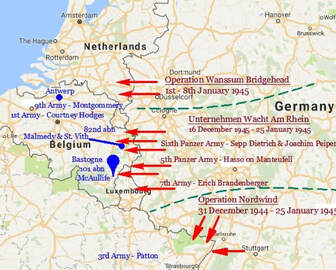 The battleground 1944 The battleground 1944 The most important part of understanding any battle is understanding the reason it is being fought. Why fight there? What did the attackers hope to achieve? Without understanding what the battle was about, you can’t know if it was a success or a failure. Yes, one side won and the other side lost, but did the winners achieve their goals? What were the consequences of losing? Was the sacrifice worth what it achieved? That is why the film of the Battle of the Bulge is so disappointing in historic terms, because it wasn’t about grabbing fuel for tanks, it was about turning the war around and pushing the Allies back to the sea, just as the Germans had in 1940. And that is where this book starts. Why was the battle being fought?  The Germans were using the same basic plan as had been used in 1914, which was the Schlieffen-Moltke plan, named after its Prussian creators when they devised it at the end of the 19th century. The plan involved a major offensive through the Ardennes Forest in Belgium and Luxembourg to strike into France where its defences were weakest. In 1914 it almost worked and in 1940 the same basic plan was used again and this time, using a combination of modern weaponry and speed, it did work. In December 1944 the aim was to strike through Luxembourg and Belgium to Antwerp, re-capture the strategically important port while, at the same time, splitting the British from their American allies so that the two forces could be defeated independently. Had the plan worked it might not have ended the war in Europe, giving the Germans a victory, but it would certainly have delayed the end of the war by many more months, possibly even years. And, of course, with the Allies defeated or delayed in the west it would allow Hitler to concentrate his forces once again to defeat Russia in the east.  German Panther V tanks advance through a Belgian village. German Panther V tanks advance through a Belgian village. The author then takes us into the minds of the commanders on the two sides. What they thought of the plan, what their mental state was in general after 5 years of war and what the political background was like. That was particularly important on the German side because by that time Hitler was directing the war almost single handed, ignoring or not seeking the advice of his military commanders. It was also important on the Allied side, where the Allied commander, General Eisenhower, was able to operate free of political interference. We then take a look at the military preparedness of both sides in the weeks and days preceding the battle. In order to assemble enough troops for the attack, the Germans had to strip both the Luftwaffe and the Kriegsmarine of men and draft into the army teenage boys, middle-aged men and some former soldiers who had already been discharged because of wounds sustained in earlier battles. It might be thought that these make-shift troops would prove to be a weak link in the plan, but they were surprisingly effective in the early days of the battle. 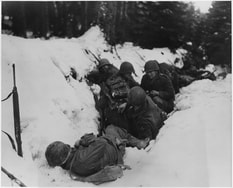 American troops take cover during a German attack American troops take cover during a German attack As well as the Volksgrenadiers (people’s grenadiers, the name given by Heinrich Himmler, who was responsible for their recruitment) there were the more seasoned troops of the German army and the SS and they provided all of the tank units that were used, as well as most of the artillery. The author provides a lot of detail about these men, having interviewed several of them. He provides similar amounts of detail for the Allied troops. On the other side, the Allies weren't prepared for a winter war. After the euphoria of D-Day and the liberation of France, the war was supposed to be over by Christmas. The Allies weren't equipped for one of the worst winters on record. Many of the casualties suffered weren't the result of combat, they were the result of the weather: hypothermia, frost bite and trench foot. Many American soldiers just froze to death. Once the battle starts the author takes us through what happened on the various axes of the German advance, telling us about the men who fought and the terrain over which the battle was conducted. He has visited a lot of it and provides some interesting details of what he has found while walking over the ground. His military eye is able to pick out details that a civilian would probably not notice. Readers who have a mind to do so, could pick up some interesting souvenirs should they ever visit the area.  An American Sherman tank at Bastogne. An American Sherman tank at Bastogne. Admittedly this is a bit of a niche subject and won’t be of much interest to some readers. It was also an American battle for the most part, so may not be of much interest to British readers, though there was some British involvement; General Montgomery was given command of the American forces at the northern end of the battlefield, and British troops did fight in some engagements. But the book is aimed at people with an interest in military history and World War II in particular. For those readers I thoroughly recommend “Snow and Steel” by Peter Caddick-Adams. To find out more about the book, click on the cover image at the top of this review. If you have found this blog interesting or informative, why not sign up for our newsletter to get more book recommendations. Just click the button below. Would you like to be a guest reviewer for the Selfishgenie Publishing blog? Contact us with details of the book you'd like to review. Just three rules:
 Following on from last week’s blog about literary figures insulting each other, I received quite a few emails giving examples of more general insults. So many, in fact, that I have decided to do a blog just on them. First of all, some of these may be quotes from the writings or speeches of other people, living or dead, so I beg forgiveness from those whose words I have used without giving them the usual citations and credit. However, so many of these are now going around the internet that they almost fall into the category of “public domain” – even if they don’t fit the legal definition of that phrase. So, be flattered that your words have found such fame. But my thanks to all my readers who have taken the time to send these in. Without you I would have had to apply some original thought to write this week’s blog and that would have made my head hurt. I’ve tried to place all of these into categories, but some would fit into more than one and some don’t fit anywhere, so I’ve included them under “miscellaneous”.  Appearance
You’re not ugly, you’re just someone it’s hard to look at. You’re so fat, people jog around you for exercise. (I could have done a whole blog on fat jokes alone, but this is my favourite). I’m not saying you’re ugly. It's just that you're 8 beers away from being my type. Who gave you that haircut? Do you want me and the boys to go around and beat him up? Mirrors can’t talk. Lucky for you they can’t laugh either. Halloween finished yesterday, so you can take your mask off now. You are living proof that there is no God, because God is supposed to have created mankind in his own image and no one would worship a face like yours. Everyone has the right to be ugly, but you abuse the privilege.  Dress sense I’m sorry, were we supposed to dress stupid today? I know that sometimes fashions come back around a second time, but you won’t see that style again until the next time Halley’s comet appears. I know your look is supposed to be ‘old school’ but schools were never that old. You do know that this office doesn’t have a “dress down Friday”, don’t you? Besides, which, it’s Monday. Wurzel Gummage was on the phone. He asked if he could have his suit back. I see you had another power cut while you were getting dressed. I didn’t realise you were so brave until I saw what you were wearing.  Ego NASA called; they asked you to step to one side because your ego is blocking out the Hubble telescope. It’s been several centuries since they discovered that the world revolves around the Sun and not around you. NASA called. They’ve finally built a rocket big enough to match your ego. Your biggest fan is the one on the ceiling. Do I think you’re clever? I’m sorry, but my mother taught me not to lie. If you were as great as you think you are, someone else would have noticed by now. You are the very definition of “Z List celebrity”. Do I know who you are? Of course I do. But I have to serve you or 'll get lose my job. 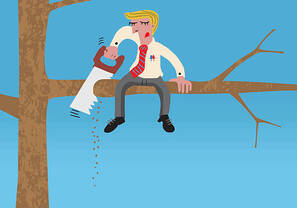 Intelligence I’m surprised at your level of stupidity. If stupidity was a currency, you would be a billionaire. Of course I talk like an idiot. How else could you understand me? Your head is just there to keep your ears apart. I can explain it to you, but I can’t understand it for you. Fools are temporary, but stupidity like yours is forever. If brains were dynamite, you wouldn’t have enough to blow your hat off. Somewhere out there is a village that’s lost its idiot. I’d have to have my head amputated before my IQ would be as low as yours. Without stupidity, there would be no way of recognising intelligence, so in that sense you are important. It’s always been said that two heads are better than one, but not when one of them is yours. It’s the university on the phone. They’re trying to find out how long a human can live without a brain and want to know how old you are. Quick, stand next to me. I need to look good and next to you I look like a genius. I used to say “please engage brain before speaking”. Then I met you. Now I say “please engage brain before thinking”. It’s a good job that stupidity isn’t a crime or you would be serving a life sentence. I’ve just realised that you aren’t as stupid as you sound. No one could be that stupid and still be capable of breathing. Miscellaneous Please don’t interrupt me when I’m ignoring you. Allowing you to survive childbirth was medical malpractice. I’d slap you, but that would be animal abuse. How can I insult you? Nature has done such a great job already. Do you still love nature, despite what it did to you? I went looking for your family tree and it turned out to be a bonsai. My door is always open, so feel free to leave anytime now. Of course I’ve got time to see you. How about 30th February? Be kinder to your parents. Don’t go home so often. I've researched your family crest. Apparently it's an anchor with the letter W above it. 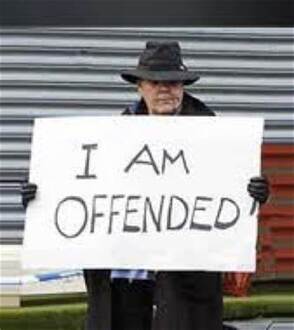 Offence (the taking of) You find it offensive? I find it funny. That’s why I’m happier than you. You only feel offended because what they said applied to you. Honestly, I didn’t mean to cause offence. That was just a happy accident. (Best read in a Yoda voice) Cause offence did I? Don’t care a bit do I. I will defend to the death your right to be offended if you will defend to the death my right to cause offence. No, I wasn’t offended. He was right, I am a stupid idiot. And you are an even bigger idiot for not knowing that. 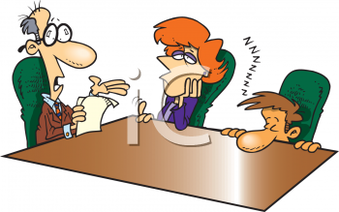 Personality I won’t say you are shallow but compared to you a puddle has hidden depths. Life is good, you should get one. You are an oxygen thief. You are a waste of good skin. I’d like to say it’s been a pleasure meeting you, but I’d be lying. I’ve just discovered that there is a God. I asked him to punish me and then you turned up. Compared to hearing one of your stories, the ticking of a clock is an entertainment. With all the wonders of technology: photoshop, auto-tune, plastic surgery, it’s such a pity that there’s nothing it can do to improve your personality. You have given a whole new meaning to the expression “sour grapes”. You are the photoshop of truth telling. Yes, you can help me solve my problem. Go away. Being here with you makes me want to go to the dentist. It will be so much more fun. That wasn’t a round of applause, that was just everyone slapping their own faces trying to stay awake while they listened to you. 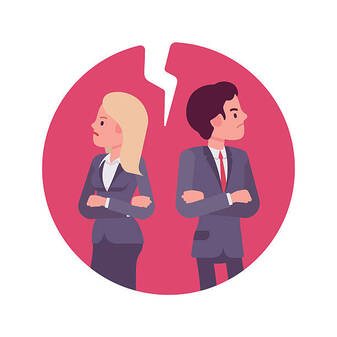 Relationships. My phone battery lasts longer than your relationships. You deserve someone like you. You two deserve more credit. Thanks to you, two other people are living happier lives with someone else. I’d say you had bad taste in men, but then again, in life you get what you deserve. Sleeping around isn’t classed as a hobby. Relationships aren’t like shopping. You don’t get a bigger discount the more people you sleep with. When I asked the name of your last sexual partner, I didn’t expect the name of a football team. And finally If you are the sort of person who enjoys insulting others, just remember that what goes around, come around. And if your favourite insult isn’t amongst the ones above, please feel free to send it to me and it may appear in a future blog. if you have found this blog interesting or informative, make sure you don't miss future editions by signing up for our newsletter by clicking the button below. We promise not to spam you and you can unsubscribe at any time.  Mutual support Mutual support To see the way that authors support each other on social media (for the most part) it would be easy to think that things have always been that cordial in the writing fraternity. Sadly, they have not. In the past it was quite common for authors to insult each other. Even in quite recent history there has been the odd barbed comment. Now, I must make it clear that I am not advocating a return to such uncivilised behaviour. But a good insult, delivered with wit, can be a source of humour.  An Ancient Greek being insulting An Ancient Greek being insulting While there is evidence that goes all the way back to Ancient Greece, when playwrights used to insult each other’s works, they tend to become more witty as we get closer to modern times. Shakespeare is now a revered literary figure throughout the world, but it wasn’t always so. In his own time he came in for a fair share of insults. Fellow playwright Ben Johnson once said of the Bard of Avon “I remember, the players have often mentioned it as an honour to Shakespeare that in his writing (whatsoever he penned) he never blotted out a line. My answer hath been, would he had blotted a thousand.” OK, it’s not quite up there with “Your Momma” but it’s quite a damning criticism. 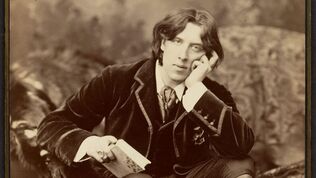 Irish poet and playwright Oscar Wilde, thinking up new insults. Irish poet and playwright Oscar Wilde, thinking up new insults. Oscar Wilde is well known for his caustic wit. After spending time “at Her Majesty’s pleasure” as a guest at Reading high security hotel (prison) he commented “If this is the way Queen Victoria treats her prisoners, she doesn’t deserve to have any”. However, that is beside the point. On writing and writers Wilde had a lot to say. This one probably holds good today. “In olden days, books were written by men of letters and read by the public. Nowadays books are written by the public and read by no one.” If you are an author and are having trouble getting readers, Oscar Wilder foresaw your pain. 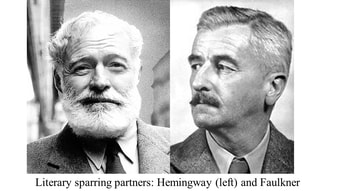 Over the years there have been some great rivalries in literature and the rivals didn’t always play nicely. William Faulkner was accused by Ernest Hemingway of being under the influence of alcohol while he wrote. He said “I can tell right in the middle of a page when he’s had his first one.” Given Hemingway’s own reputation as an imbiber, that may be seen as a pot-and-kettle sort of remark. In retaliation Faulkner quipped. “He has never been known to use a word that might send a reader to the dictionary.” Personally, I’d find that a recommendation. When I’m reading, I don’t want to have to keep looking up words to find out what the author is talking about. But maybe that’s just me. But in return for that slight, Hemingway came back with “Poor Faulkner. Does he really think big emotions come from big words?” Hemingway seems to have attracted a lot of criticism from fellow writers. In 1972 Victor Nabokov said, “As to Hemingway, I read him for the first time in the early ‘forties, something about bells, balls and bulls, and loathed it.” I was always taught not to speak ill of the dead and Hemingway died in 1961, so he didn’t even get the right of reply.  Lord Byron, who should be careful of whom he insults if he's going to dress like that! Lord Byron, who should be careful of whom he insults if he's going to dress like that! Two great rivals of late 18th and early 19th century poetry were Lord Byron and John Keats. I think it was true to say that Byron wasn’t exactly an admirer of Keats, if this quote is anything to go by: “Here are Johnny Keats’ piss-a-bed poetry, and three novels by God knows whom… No more Keats, I entreat: flay him alive; if some of you don’t I must skin him myself: there is no bearing the drivelling idiotism of the Mankin.” Ouch.  A victim of misogyny? Jane Austen A victim of misogyny? Jane Austen Male authors aren’t always gentlemen. In an era when it was considered a great social gaff to insult a woman, Ralph Waldo Emerson said of Jane Austen’s writing “Miss Austen’s novels . . . seem to me vulgar in tone, sterile in artistic invention, imprisoned in the wretched conventions of English society, without genius, wit, or knowledge of the world. Never was life so pinched and narrow. The one problem in the mind of the writer . . . is marriageableness.” But he wasn’t the only one to be critical of Austen. Mark Twain, never a shrinking violet, said of her work “I haven’t any right to criticize books, and I don’t do it except when I hate them. I often want to criticize Jane Austen, but her books madden me so that I can’t conceal my frenzy from the reader; and therefore I have to stop every time I begin. Every time I read ‘Pride and Prejudice,’ I want to dig her up and hit her over the skull with her own shin-bone.” 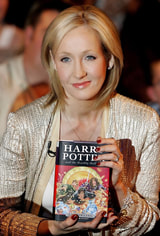 J K Rowling J K Rowling And things haven’t changed much since. Harold Bloom proved himself to be quite ungentlemanly when he said of J K Rowling “How to read ‘Harry Potter and the Sorcerer’s Stone’? Why, very quickly, to begin with, and perhaps also to make an end. Why read it? Presumably, if you cannot be persuaded to read anything better, Rowling will have to do.” Bearing in mind that Rowling aimed her books at younger readers, that was a trifle harsh coming from an adult. Bloom was about 70 then, so a little old for Harry Potter I would have thought. Sometimes these things can form chains. Gore Vidal said of Truman Capote “He’s a full-fledged housewife from Kansas with all the prejudices.” While Capote said of Jack Kerouac “That’s not writing, that’s typing.” 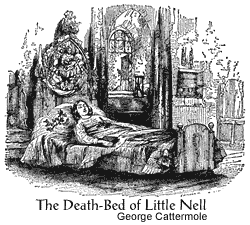 But for my final literary insult I return to the daddy of them all, Oscar Wilde, Having read The Old Curiosity Shop, by Charles Dickens, Wilde offered this opinion: “One must have a heart of stone to read the death of Little Nell without laughing.” I wish you better criticism than that, and for my closing quotes I’ll return firstly to Ernest Hemingway, “Critics are men who watch a battle from on high and then come down and shoot the survivors”. 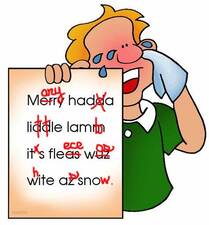 Constructive criticism Constructive criticism And secondly to Brendan Behan: “Critics are like eunuchs in a harem: they know how it’s done, they’ve seen it done every day, but they’re unable to do it themselves” Just remember that last one the next time you get a less than fulsome review. And if you are going to be critical of another author's work, at least try to make it witty. Who knows - you might even be quoted in a blog like this. If you have found this blog interesting or informative and you would like to make sure you don't miss future editions, why not sign up for our newsletter? Just click the button below. We promise not to spam you and you can unsubscribe at any time.  You’ve written this great book, but you can’t seem to capture the interest of an agent or publisher. You’ve sent it to every agent and every publisher in the listings, but all you get back is rejections and sometimes not even that. How long does this go on for before you ask yourself “Is it me?” On the other hand, you may feel that your work isn’t good enough for publication, so you may not have submitted it to an agent or publisher because you think it will be rejected. Why might you feel that way? Let me introduce you to the Dunning-Kruger effect.  Stupid people don't know they are stupid! Stupid people don't know they are stupid! This is a hypothesis in social psychology postulating that people of lower capability don’t know their capabilities are low, while people of higher capability don’t always realise how capable they are. This has sometimes been unfairly paraphrased as “stupid people don’t know they are stupid” and, of course, the opposite of that is that clever people sometimes don’t realise how clever they are. I have to say up front that there are critics of the hypothesis. Firstly, in some cultures there is great emphasis placed on modesty, so a clever person would never claim to be cleverer than someone else, because that would be immodest. Similarly, in some cultures it is considered rude to criticize others, so honest feedback on poor performance isn’t always provided. The other flaw is that the studies that were carried out to test the hypothesis used psychology students as the subjects and they aren’t representative of society as a whole. But leaving aside those criticisms, there is consistently strong evidence that the Dunning -Kruger effect is real . But what do we know about it?  David Dunning and Justin Kruger are the two American psychologists that came up with the hypothesis (published in 1999) after noting that some of their poorer performing students didn’t seem to realise how poor their performances were. They also didn’t improve after being given feedback on their performance. So Dunning and Kruger went looking for an underlying cause for this misperception of capability. To test the hypothesis, subjects were asked to complete some self-assessment tests on a range of subjects. After being given their results, the students were asked to rank themselves against their peers. Those that performed the worst tended to rate themselves higher than some of their peers, while those that had performed the best tended to rate themselves lower than some of their peers. 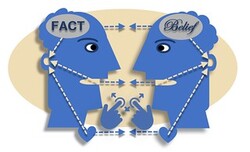 Subjects were interviewed after completing the exercise and asked why they had rated themselves as they had. The more capable students, who found the tests easiest, tended to think that their peers would also find the tests easy, so they had ranked themselves lower. Conversely, the poorer performing students, who had found the tests difficult, assumed their peers would also find the tests difficult and ranked themselves higher. This betrayed an internal bias. Poor performing students overrated their own performance, while better performing students overrated the performances of their peers. Even after providing feedback, these internal biases appeared to persist.  At this point I should inject a word of caution. The poorest performing students didn’t rank themselves in the highest performing bracket. So, a D grade student didn’t think they were performing as well as an A grade student. But they did assume they were performing as well or better than a C grade student. So, what has this to do with finding an agent or a publisher? Well, if we extend the Dunning-Kruger hypothesis into the world of publishing, an author who isn’t a great writer may, thanks to this internal bias, think that their work is better than it is. This will make it hard for them to understand why they are getting rejection after rejection.  On the other hand, a good writer may feel that their work isn’t as good as that of other good writers and that may discourage them from submitting their work to an agent or publisher in the first place, because they assume it will be rejected. If that is the case, is there a solution for the writer? There may be. The first thing to do is to understand that a cognitive bias actually exists and recognise the effect it might be having on our own perception of ourselves. We need to actually ask if we are as good (or as poor) as we think we are. And the only way to answer that question is to seek out unbiased feedback.  Many of you will already have worked out that I’m talking about beta readers. Friends and family aren’t good beta readers, because they don’t want to hurt the author’s feelings. They would tell William McGonagall* that his poetry is great if he was a friend or relative. This means that if an author wants honest feedback on their work, the beta reader must be a stranger, so that they can provide feedback that is free of any bias caused by emotional involvement. But there is a trap here that many authors – and beta readers – aren’t aware of. While a beta reader may start off being an unbiased stranger, that relationship changes over time. Authors want the best feedback, so they will nurture a valued beta reader and use them again and again. But the beta reader is bound to have an emotional response to that nurturing and that may affect the nature of their feedback. In other words, they may develop an emotional bond with the author which could classify them as a friend, thereby losing the independent viewpoint that made them so valuable in the first place. You might think of it as the Catch-22 of beta reading. If you are starting to think of a beta reader as a friend, then they have lost their value, but not treating them as a friend risks losing them. Ideally an author will find new beta readers for each new work. But that means a lot of work identifying and cultivating them, only to have to do it all over again for the next book and the next.  Florence Foster Jenkins Florence Foster Jenkins But being aware that the trap exist in the first place is a good first step. Be aware that the beta reader may want you to like them almost as much as you want them to like your work. As soon as you have exchanged email addresses, an emotional bond is starting to form, so it is necessary for both authors and beta readers to try to maintain an “arm’s length” relationship. However, having independent feedback is no use if you don't respond to it. Your beta readers have given you feedback - use it to improve your work. If you ignore it because it isn't what you want to hear, you have fallen into another trap and the Dunning-Kruger effect even predicts that trap because it identified that subjects often didn't respond to feedback on their performance. Who knows, you may improve your work enough to find an agent or a publisher. * William McGonagall (1825-1902) was a Scottish poet whose poems were so bad that he became famous. People paid to see him read his poems for the comedy value (his work was quite serious in its subject matter). McGonagall, however, was deluded enough to interpret that as evidence of his genius. See also Florence Foster Jenkins. If you have enjoyed this blog or found it informative, why not make sure you don't miss future editions by signing up for our newsletter. Just click the button below. We promise not to spam you and you can unsubscribe at any time. |
AuthorThis blog is compiled and curated by the Selfishgenie publishing team. Archives
January 2025
|


 RSS Feed
RSS Feed